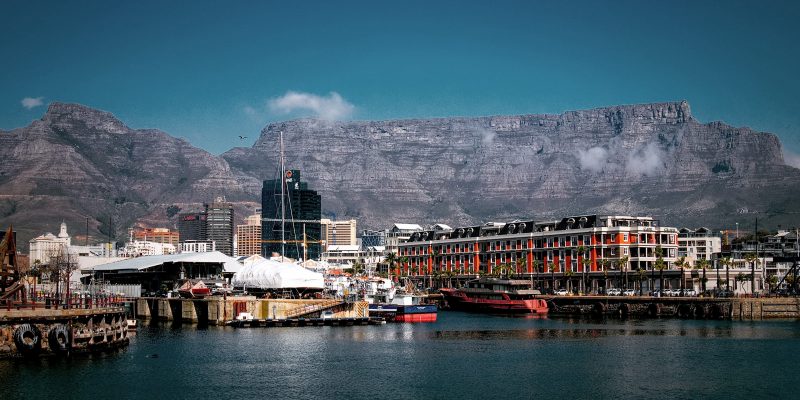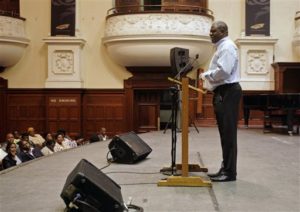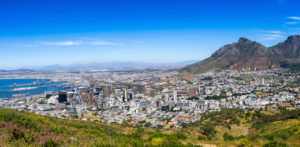Will Cape Town’s Day Zero Arrive?
A longtime resident reports on the water crisis in the South African city, where the supply to homes and businesses is expected to be cut off in May, and his own efforts to slash consumption. Cape Town and Table Mountain await rain. (Matthiasmulle / Wikimedia Commons)
Cape Town and Table Mountain await rain. (Matthiasmulle / Wikimedia Commons)
Leonie Joubert is a longtime resident of Cape Town.
Day Zero is real. The Day Zero concept means that Cape Town’s utility managers will switch off water to residential buildings and businesses, and continue to supply only critical services such as hospitals, and also the communal taps in slum neighbourhoods where people already collect their water in buckets every day.
This means most people in the suburbs will have to collect their daily 25l [liters] (0.88 cubic feet) water ration from 200 new distribution points. People have been warned that the military and police are on standby to manage any civil unrest.
The fear is that the entire economy will grind to a halt, as businesses and schools shut down, lacking water to drink or to flush toilets.
Households are currently asked to stick to a daily limit of 50l, but enforcement is difficult. The city says significant numbers of households, mostly wealthier ones, still massively exceed this figure.
Will Day Zero happen?
If Day Zero does dawn, the taps will be “turned off” for about three months. The Western Cape province, in which Cape Town lies, will head into its annual rainy season in late May (our Mediterranean climate brings rainfall in winter).
An academic close to a local university’s climate modelling team, and also privy to the city’s emergency water task team, says the concern isn’t whether or not Day Zero actually arrives (some well-informed pundits say it won’t).
The issue is what happens next summer: no matter how much rain we get this winter, it won’t be enough to recharge the province’s dams to meet 2019’s needs.
Communications hype?
The claim that this is the “worst crisis to face a city since World War II”, made by the provincial leader of the Democratic Alliance, Helen Zille, is criticised as hyperbole.
A local newspaper columnist, Tom Eaton, wrote recently that Zille appears to momentarily have forgotten about “major cities called Sarajevo, New Orleans and Aleppo, each of which has faced ‘challenges’ in the last 30 years that, one might argue, rival that faced by Cape Town.”
My source who says the day may not arrive reckons the Day Zero idea is more of an emergency messaging concept to urge behaviour change, than an actual event likely to occur.
True or not, the bottom line is that Cape Town (a city that’s run by the chief opposition party, the Democratic Alliance/DA) is being heavily criticised for mismanaging the crisis, for several reasons.
Political rivalries
The national government (run by the African National Congress) is responsible for bulk water infrastructure, and appears to have been stalling on water delivery in the Western Cape province for the past decade.
The province is run by the ANC’s chief opposition, the DA. But critics say the DA could nevertheless have implemented much tighter water restrictions, sooner, in what now turns out to be a severe three-year drought.
They say the city should also have been exploring underground aquifers and desalination options much earlier, to get the laborious and bureaucratic tender processes passed and the infrastructure in place well before now. The city is also being accused of ignoring projections on population growth
The DA is charged too with blaming the unpredictability of the climate for their failure to plan: climate modellers have long been projecting a hotter, drier climate for the Cape, with longer droughts and more variable rainfall.
The city is selling this three-year drought as “unprecedented”, while some critics are calling it “the new normal”. Either way, the DA regularly points out that the climate models gave no warning of a drought this severe.
The city regularly says it will crack down on its top 100 most wasteful water users, through fines, temporary water cut-offs, or by installing devices letting it throttle back on household supplies to high users. Unfortunately it lacks the resources to install the devices fast enough.
Behavioural economists at the University of Cape Town (UCT) have done some preliminary research with city utility managers to see how short carefully crafted messages in people’s monthly utility bills can bring about voluntary adoption of water-wise behaviour.
Professor Martine Visser from the Environmental Policy Research Unit at UCT found that wealthy water consumers are more likely to cut their use if they know they will be praised publicly (for instance, on the city’s website) as “water wise”.
But they’re less likely to respond to threats of increased tariffs or fines for high usage, because their water bills constitute such a small part of their overall budget.
My water rationing
I have been surviving on about 40l of water a week for the past five months. I switched off my hot water cylinder in September because I found that even if I collected all the cold water that ran through the shower in a bucket, before hot water came through, it still collected twice as much water as I’d use to shower, once the hot was running. It is much more efficient to simply boil a kettle and then bucket-bath in about 3l of water.
From this month I’m now down to a daily water ration of about 26l:
Bucket bath: 3l (goes to first load of laundry, which then goes to flushing) Dishes: 2l Flushing: 20l (x 2 daily, about 12.8 l of which is grey water) Cooking: 1l Brushing teeth/washing hands: 1l Drinking (water, tea etc): 2l Laundry: 12.8l (2 x loads per week = 90l divided by 7 days = 12.8l, which goes to flushing) TOTAL: ±26l daily
Your support matters…Independent journalism is under threat and overshadowed by heavily funded mainstream media.
You can help level the playing field. Become a member.
Your tax-deductible contribution keeps us digging beneath the headlines to give you thought-provoking, investigative reporting and analysis that unearths what's really happening- without compromise.
Give today to support our courageous, independent journalists.




You need to be a supporter to comment.
There are currently no responses to this article.
Be the first to respond.